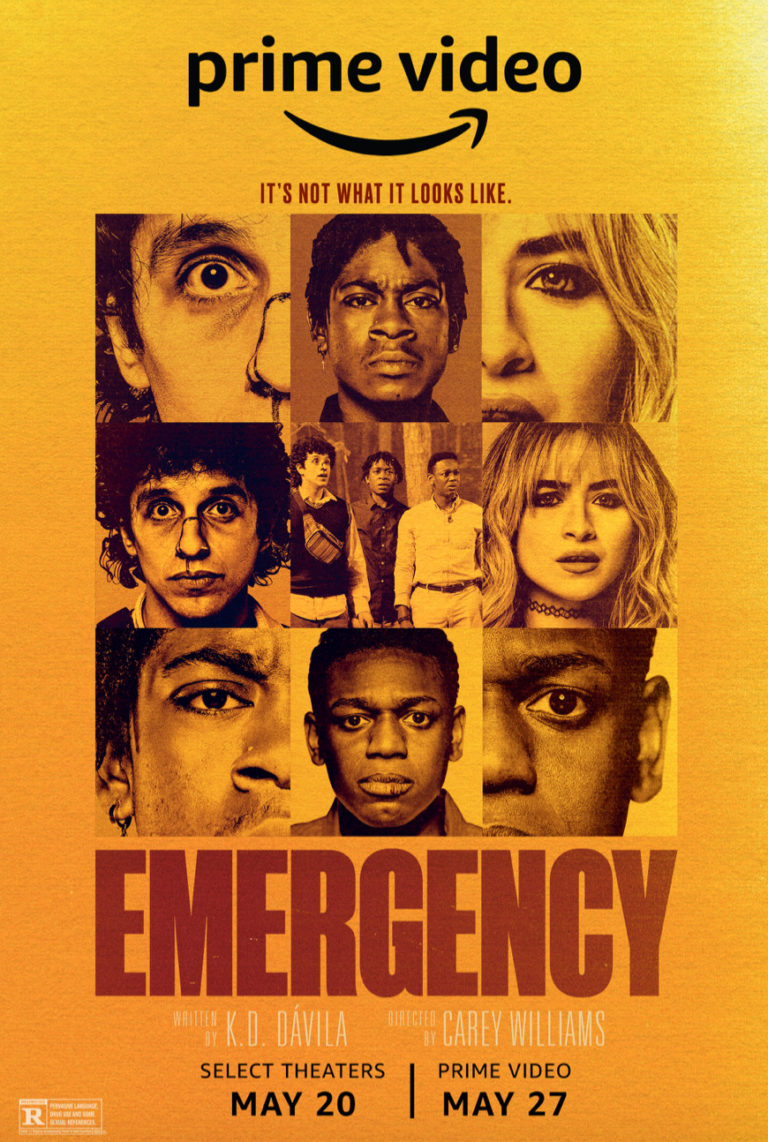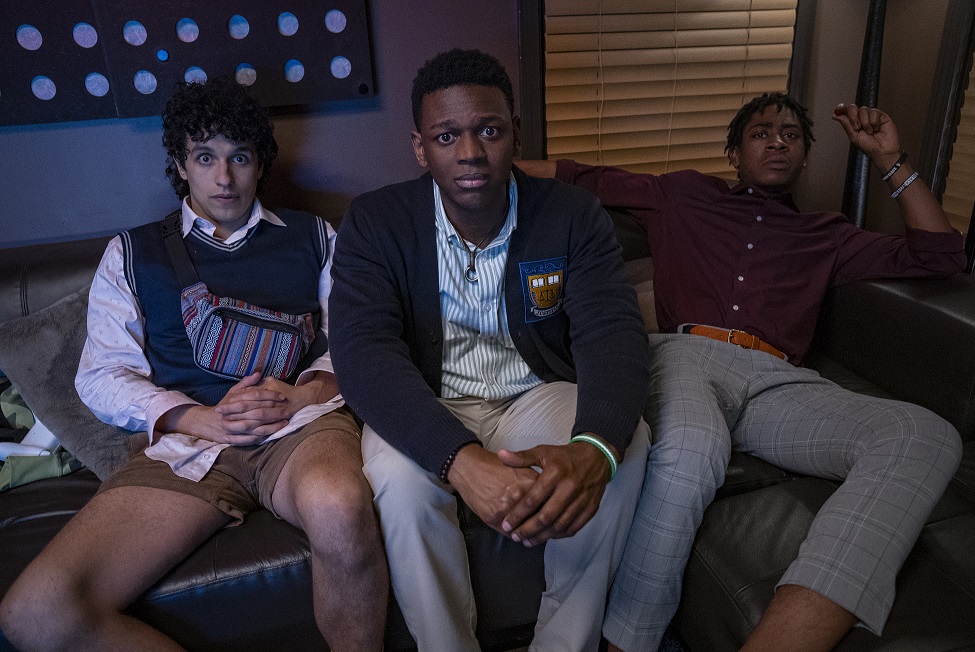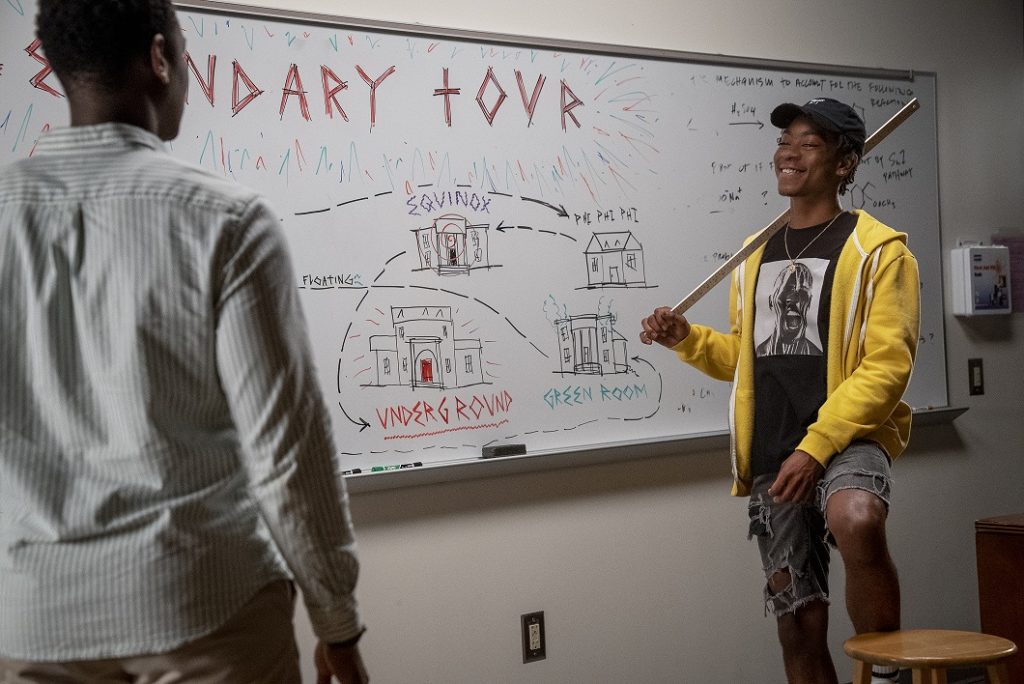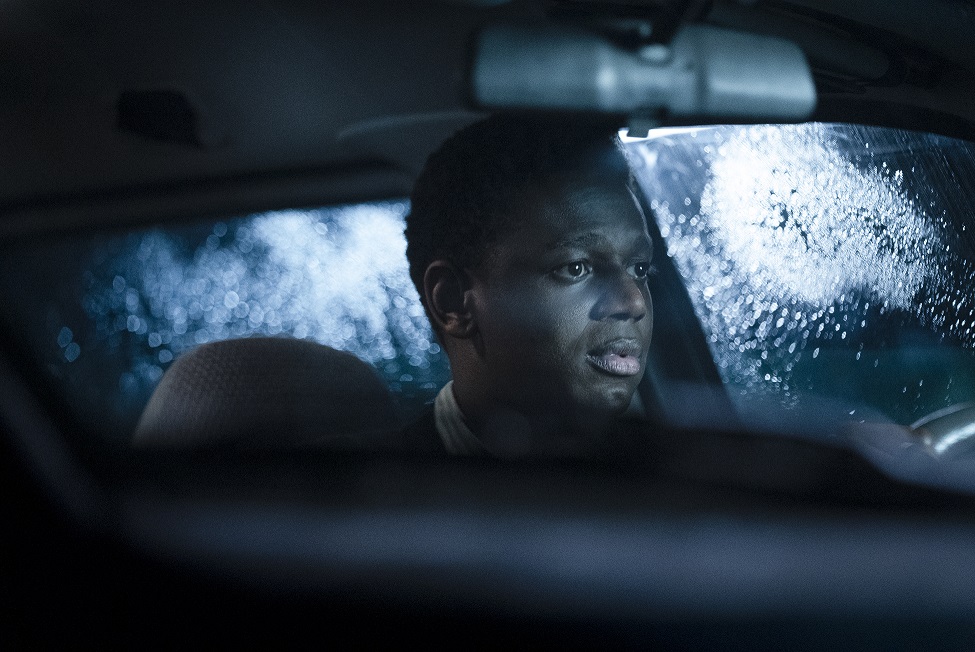
In the film Emergency, which made its debut at the Sundance Film Festival in January, three friends, Kunle (Donald Elise Watkins), Sean (RJ Cyler), and Carlos (Sebastian Chacon), set out to complete a legendary tour of their college party scene. Their night is thrown into chaos when they find a white girl passed out on the floor of their home, and are forced to contemplate the potential misconceptions that will be assigned to them because Kunle and Sean are Black and Carlos is Latino.
Emergency, which won the U.S. Dramatic Waldo Salt Screenwriting Award at Sundance for Oscar-nominated screenwriter K.D. Dávila, takes a concept that is both terrifying and entertaining and turns it into a remarkable cinematic experience. I had the chance to speak with Watkins, Cyler, and Chacon about the appeal of these roles and how they would classify its genre. These interviews have been edited for clarity and coherence.

Q: What drew you to this project?
RJ Cyler: Carey Williams used to do a lot of music videos and shorts. R#J was his first feature, and my first time working with Carey. I noticed back then that he makes the camera into another character, so the audience then feels like a part of the film, if that makes sense. The way that he shot R#J was very handheld, with a cell phone and through different slides and media feeds. When he explained it to me, I thought it was crazy as hell. I was like, holy crap, that sounds cool. I hadn’t heard it explained that way, and so I was mostly wondering how he’s going to pull it off. But then when I saw it, I didn’t get lost in it. I was like, okay, cool, I can trust Carey with anything. When I heard that he was doing Emergency and he sent me the script and told me where he wanted to go with it, I was like, I’m all in for it.
Donald Elise Watkins: I was in the middle of some other things and then this script comes along and I’m thinking, whoa! And actually, I didn’t think that I would be able to do the part, because, on paper, I don’t know if you know, but I’m not a small person. I’m not a little guy. There were things in the script, where I was like, I feel like Kunle is a smaller guy, and Sean’s more like this big guy and they have things about him towering over him and the scene in the woods where he just holds the phone and he can’t get to it. I was like, there’s no way unless they get like Dwayne Johnson or something to be Sean. I don’t know how believable this is going to be. So I didn’t think anything of it. I knew that I really enjoyed the character and that I hoped that it swung my way. It just kind of progressed and went on, and I prayed a lot and then it came through and I was excited.
Sebastian Chacon: I just got sent the script like I usually do, through my agent. The first time I read it, I almost didn’t audition. I loved the script, but I was just thinking of friends of mine who would be better for this type of role. I had just come off playing a string of career criminals in a row, so I was like, oh man, the nerdy awkward rocket scientist, they’re not going to want me for that role. But I decided, let’s give it a shot, and I auditioned, and we had the callbacks and the chemistry test and everything. It was just so easy with RJ and Donald. Immediately there was a chemistry and it just flowed really well.

Q: What did you relate most to about your character?
DEW: I think there’s a joy that comes with him. My friends always say that I always see the good in people. I really enjoyed that about him. He had this thing, this line, where he was like, I’m sorry that my childhood was happy. For all intents and purposes, I had a really good childhood. I had a great family and wonderful friends and played outside a lot. I feel like I had maybe 48 hours in the day because there’s no way I can play as many video games as I did plus play like 12 hours outside. But yeah, I really think that the joy is something that I really appreciate with him, and being like the universal friend. Kunle really gets along with everybody. He’s the person who can get in the car and put his music on shuffle. It doesn’t matter who’s in the car, they’re just like, yes, we like this, we’re with this. I always feel like that friend that links all my other friend groups together. Getting a chance to play a character like that was something that was pivotal to me.
SC: As a Latino actor, there’s a lot of tough guys, a lot of them. There’s a lot of really put-together individuals, and I appreciate that Carlos is nasty. He doesn’t leave his room. He’ll eat Hot Pockets and granola all day, and that’s kind of a universal experience. As a kid, I definitely spent a lot of time reading and playing video games and stuff like that. To be able to represent that and have that just be like a normal part of this film is just fantastic. I was talking to my little brother, his friends were in his little group chat saying, your brother’s playing Civilization? We saw the trailer. He’s playing Civ, that’s crazy! Yeah, I love that.
RC: In some ways. I don’t vape. That’s not my thing. I’m not as hardheaded. I mean, of course, I’m hardheaded, right, but Sean is, like, whoa. But in a lot of ways, I am like Sean, from his loyalty to his protection of those he loves. Also his thing of just saying how it is. That’s RJ in general. His bond between him and friends also. Wanting to be alone in a way but also really, really wanting to have people that care about him. Yeah, it’s so many different levels of Sean that just match RJ, that’s why he kind of fit me like a glove. I really like to play characters that embody a different version of me.

Q: Do you consider this film a comedy?
DEW: Yeah. Well, I don’t know. I wouldn’t just deem it a comedy. I think it kind of blends between a lot of different genres, but I think that’s also how life goes. You can be having fun one moment, and then next thing you know, there’s some stress. And then there’s more laughs. And now there’s things that you really have to get intense about and take care of, and then you get back to laughs and then maybe there’s a motion that comes up and you breeze through, I don’t think you hold on to anything. And I love the way that Carey would direct this because we weren’t trying to play at anything. It wasn’t like, okay, let’s go for laughs here, let’s do this. It was just about what’s happening in this situation and the absurdity of that is something that I think that’s where the laughs come from, the uneasiness with the characters and the audience. Sometimes you got to laugh in order to not cry or to freak out. But yeah, I would say it’s a healthy mix.
SC: Yes, I think it’s definitely hilarious. There are moments when we were on set where we were laughing and then they conveniently cut away just before that happens, but I think that’s important, for it to be funny and light and kind of wonderful until it’s absolutely not, and then you really go on the journey with these people and discovering how fucked up the situation is about to get.
RC: I will say it’s a comedy-drama. I wouldn’t say dramedy. It’s mostly a rollercoaster. It’s mostly a fun time, but the whole time the story is serious, but you don’t recognize that, okay, this is actually a life or death situation. It’s not fun to them. But to take the audience along this ride without scaring or losing people because of the bad of it all, just seeing us in frantic motion the whole time.
DEW: I’m always interested to find out how other people saw it too. I know that a lot of people of color that watched it, they’re like, I was on the edge of my seat the whole time. I think you know that there is always this inherent threat and that comes from society, it’s just kind of life. Feeling like you’re walking around and your skin is a weapon is something that you can’t take lightly and it’s hard to convey that to another person. Like, your skin. Not anything that you did. It’s literally your skin, and I find myself doing this in regular life. It’s like making apologies for being black. Like if I’m in a situation, if I’m walking down the street and I see somebody else coming my way, even if it’s broad daylight, hey, okay, let me look non-threatening. You deserve to take offense, in this case, they deserve to be able to have a good spring break, and to do a legendary tour and to go out just like everyone else does and enjoy themselves, but they can’t do that.
Q: I saw this film at Sundance and am excited to be revisiting it again. What was it like to premiere this film there, but not in person?
SC: The last time that that we were screening this film was at SXSW and it was great to see all these people who had already seen it at Sundance and had thoughts developed and feelings and whatnot.
DEW: That’s the consensus of the day. People who saw it at Sundance, okay, you’ve been living with it for a while. I like it.
RC: Me and Sundance, we’ve been rocking since the beginning of my career with Me and Earl and the Dying Girl. I know last year and the year before, it’s just been virtual, which really took a big part of the feeling of Sundance. My thing is just being outside and bouncing from theater to theater party, being able to see different artists and what work they’re putting out into the festival. It was still cool, the virtual part, just because I got to do it in my pajamas.
Q: How do you feel about Prime Video as this film’s distribution home?
SC: Oh, fantastic. Really something that I’ve been anxious for is just trying to have as many people as possible see this film. We’ve done great on the festival circuit, and I’ve heard these wonderful things from people on the festival circuit who are film buffs and whatnot. But I want my regular people to see this movie, you know, I want people to be able to have conversation and I think that Prime Video is a great avenue. So many people will have access to it, and I think the more people who see it, the bigger of a conversation it can be.
Grade: B+
Check out more of Abe Friedtanzer’s articles.
Emergency is now playing in theaters and premieres on Prime Video on Friday, May 27th.

